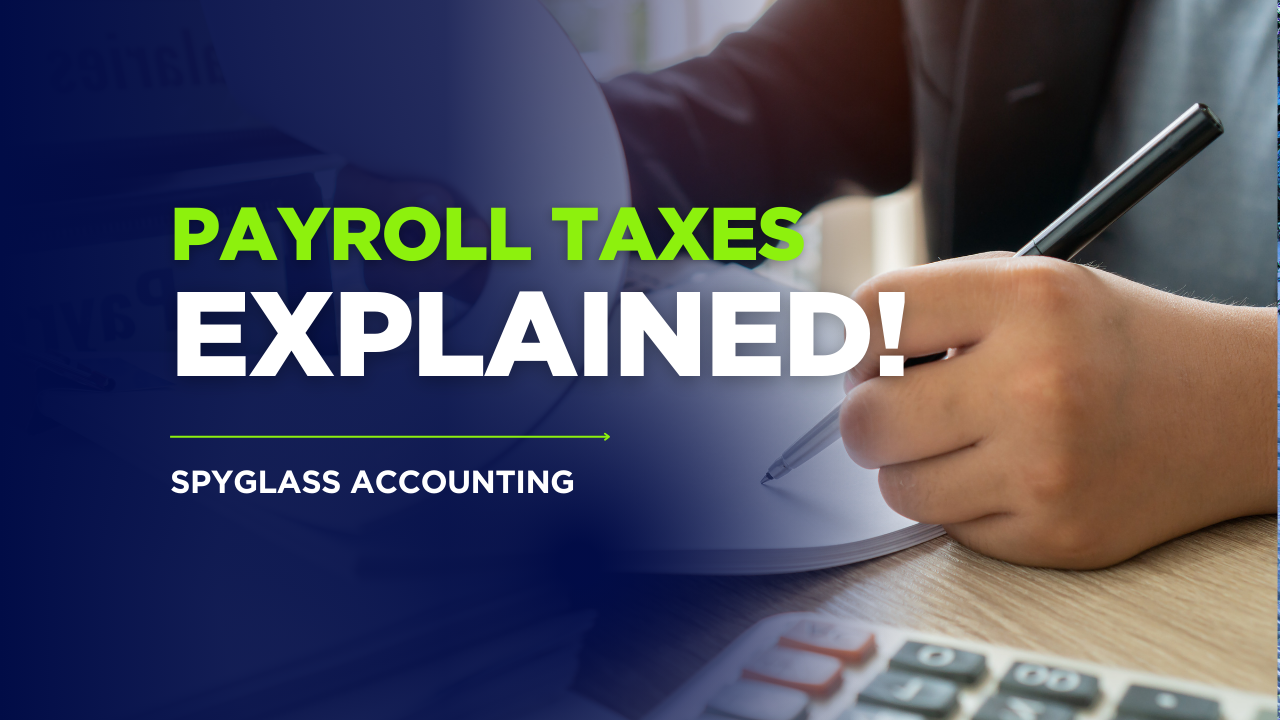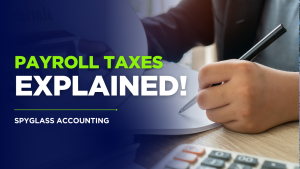
Payroll Taxes Explained: Your Top Questions Answered
Payroll taxes are a critical part of running a business, but they can also be one of the most confusing aspects for employers and employees alike. From understanding what payroll taxes are deductible to knowing when they’re due, there’s a lot to unpack. At Spyglass Accounting and Financial Services, we’re here to simplify the complexities of payroll taxes and help you stay compliant while maximizing your financial efficiency.
Let’s dive into the most common questions about payroll taxes and provide clear, actionable answers.
1. Are Payroll Taxes Deductible?
Yes, payroll taxes are generally deductible as a business expense. Employers can deduct the portion of payroll taxes they pay, including:
- Social Security and Medicare taxes (employer’s share).
- Federal Unemployment Tax Act (FUTA) contributions.
- State unemployment taxes.
However, employees cannot deduct payroll tax withheld from their wages.
2. Can Payroll Be Reversed?
In some cases, payroll errors can be corrected through a payroll reversal. This process involves voiding or reversing a payroll transaction to fix mistakes like overpayments, incorrect tax withholdings, or duplicate payments.
- How It Works: Use your payroll software to reverse the transaction and reprocess the payroll correctly.
- Important Note: Always consult a payroll professional to ensure compliance with labor laws and tax regulations.
3. How Does Payroll Work?
Payroll is the process of paying employees for their work. It involves:
- Tracking Hours: Recording hours worked by hourly employees.
- Calculating Gross Pay: Multiplying hours by the hourly rate or using a fixed salary.
- Deducting Taxes and Benefits: Withholding payroll tax, insurance premiums, and retirement contributions.
- Issuing Payments: Distributing net pay via direct deposit, check, or other methods.
- Filing and Reporting: Submitting tax forms and reports to the IRS and state agencies.
4. How Do Payroll Taxes Work?
Payroll tax include taxes withheld from employees’ wages and paid by employers to fund government programs. They include:
- Employee Withholdings: Social Security, Medicare, and federal/state income taxes.
- Employer Contributions: Matching Social Security and Medicare taxes, plus unemployment taxes.
These taxes are calculated as a percentage of taxable wages and remitted to the appropriate agencies.
5. What Payroll Taxes Do Employers Pay?
Employers are responsible for paying the following payroll taxes:
- Social Security Tax: 6.2% of wages (up to the wage base limit).
- Medicare Tax: 1.45% of wages (no wage limit).
- Federal Unemployment Tax (FUTA): 6% of the first $7,000 of wages per employee.
- State Unemployment Tax (SUTA): Rates vary by state.
6. When Are Payroll Taxes Due?
Payroll taxes are due on a regular schedule, depending on the size of your business:
- Monthly Depositors: Taxes are due by the 15th of the following month.
- Semi-Weekly Depositors: Taxes are due within a few days of the payroll date.
Annual filings, such as Form 940 (FUTA) and Form 941 (quarterly federal tax return), have specific deadlines.
7. Where Does Payroll Tax Go?
Payroll tax funds essential government programs:
- Social Security and Medicare: Support retirement and healthcare for seniors.
- Unemployment Taxes: Provide benefits to workers who lose their jobs.
- Income Taxes: Fund federal and state government operations.
8. Which Payroll Taxes Are Paid by Employers?
Employers pay the following payroll taxes:
- Social Security and Medicare: Matching contributions (6.2% and 1.45%, respectively).
- FUTA: Federal unemployment tax.
- SUTA: State unemployment tax (rates vary).
9. Why Is Payroll Important?
Payroll is the backbone of any business because:
- It ensures employees are paid accurately and on time.
- It maintains compliance with tax laws and labor regulations.
- It builds trust and morale among employees.
- It provides accurate financial records for budgeting and reporting.
10. Will Payroll Taxes Change in 2025?
While payroll tax rates are generally stable, changes can occur due to new legislation or adjustments to wage base limits. For example:
- The Social Security wage base limit may increase to account for inflation.
- New tax credits or deductions could be introduced.
Stay updated by consulting with a tax professional or monitoring IRS announcements.
Final Thoughts
Understanding payroll taxes is essential for both employers and employees. From knowing what’s deductible to staying on top of deadlines, proper payroll management ensures compliance and financial stability.
At Spyglass Accounting and Financial Services, we specialize in helping businesses navigate the complexities of payroll taxes. Whether you need assistance with payroll processing, tax filings, or compliance, our team is here to support you every step of the way.
Have more questions about HR & payroll tax? Let’s talk!
